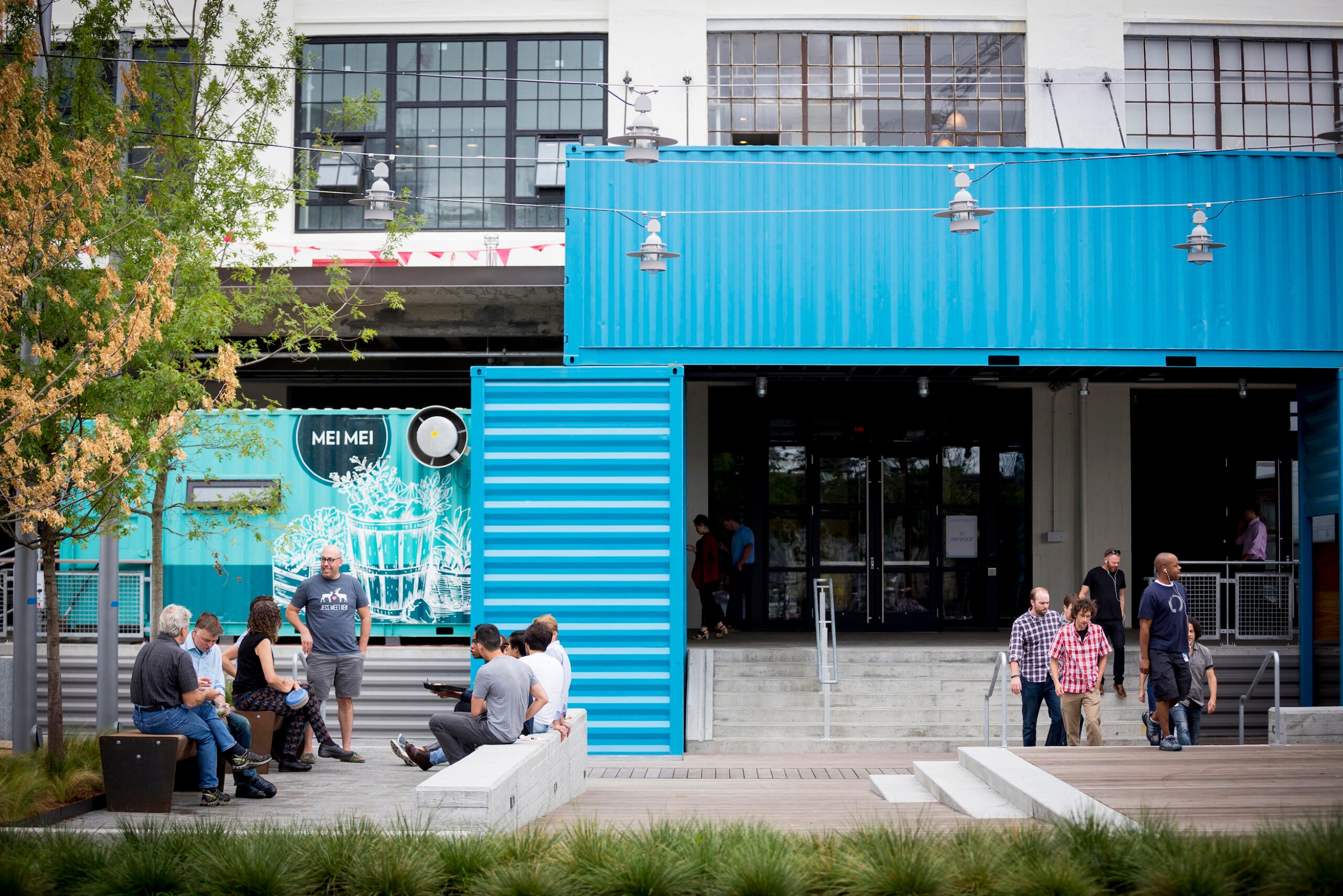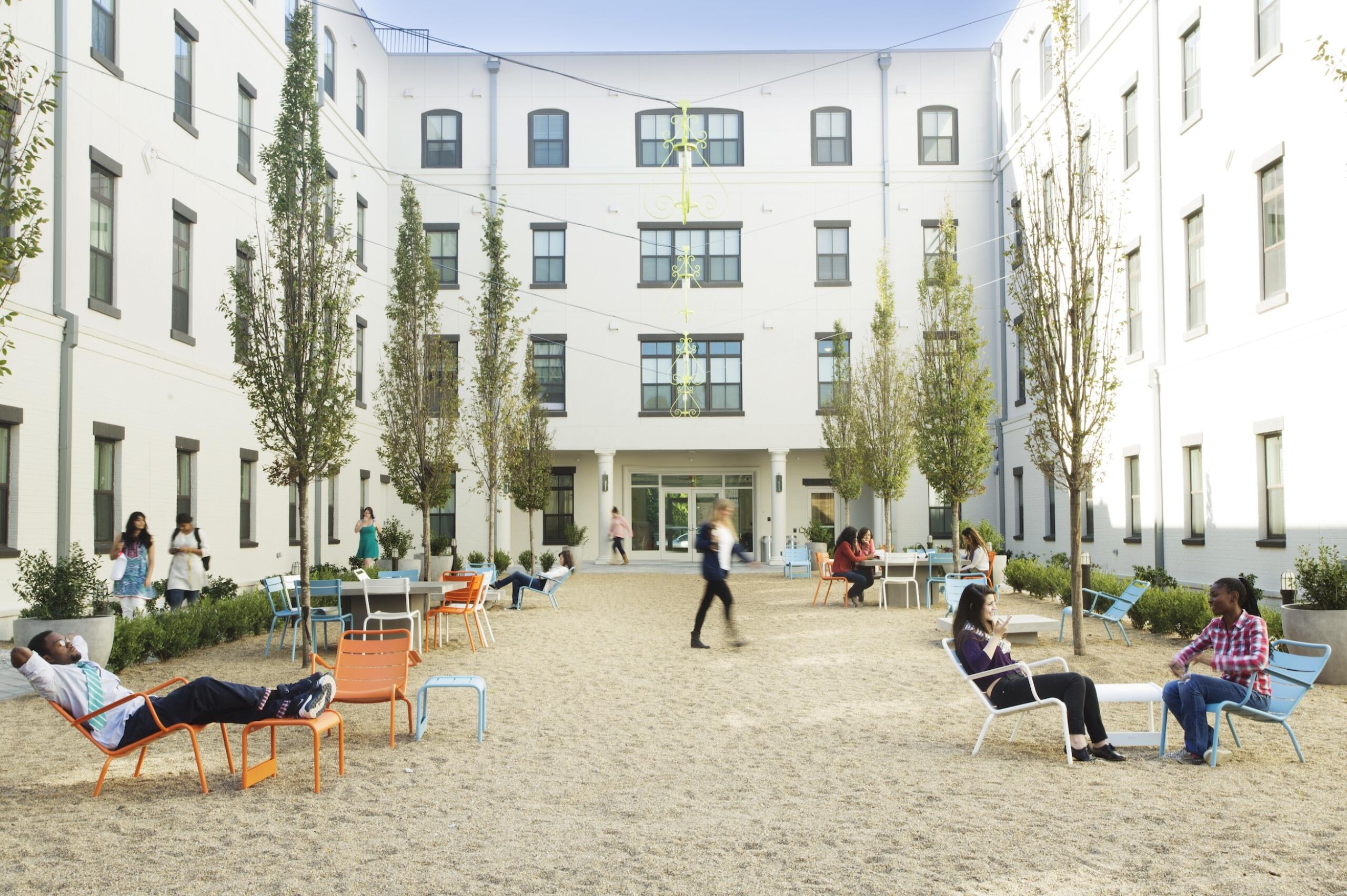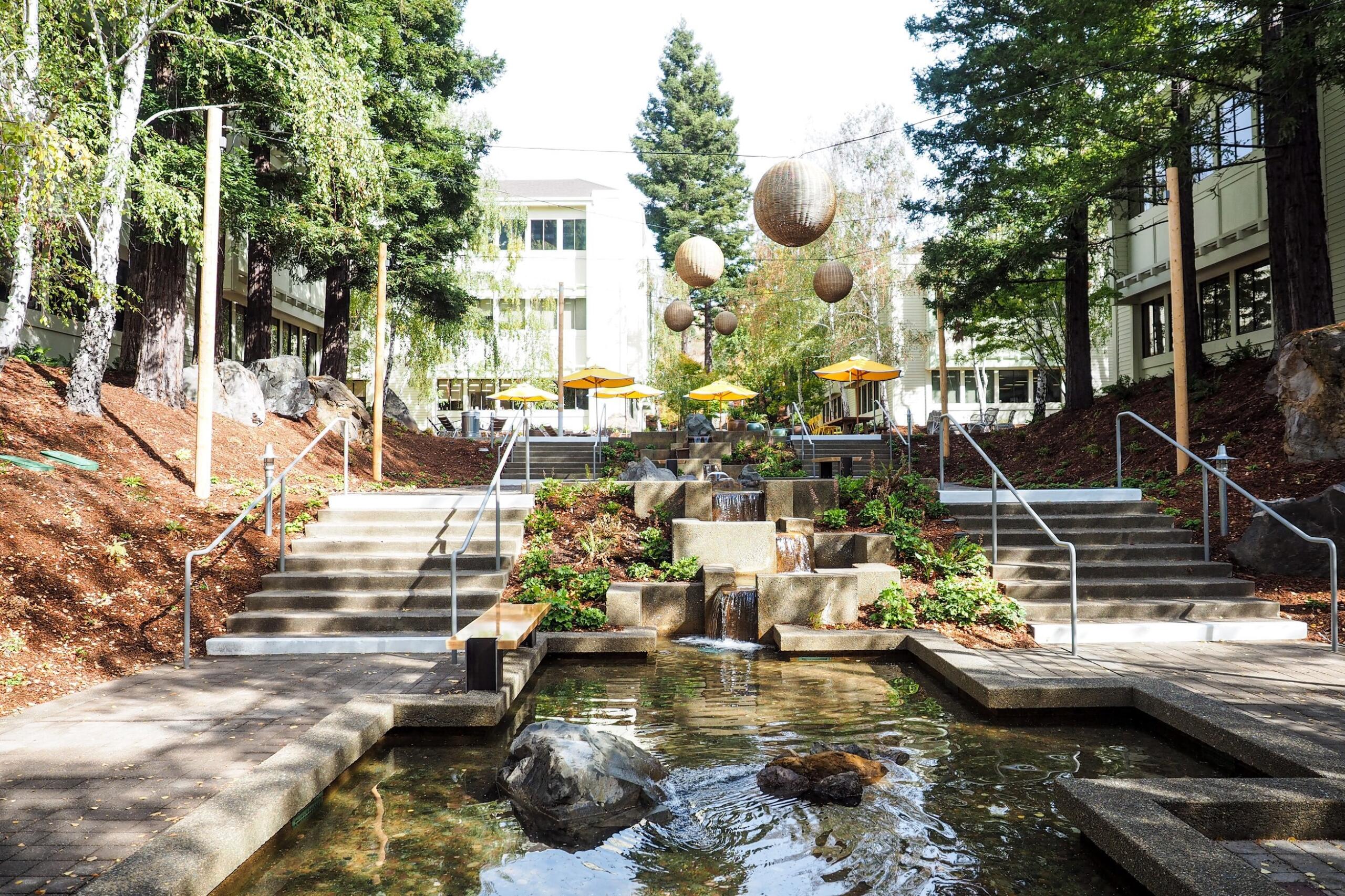
Sustainability and Social Responsibility
Through Jamestown Green and the Jamestown Charitable Foundation, we are reducing our impact on the environment and supporting the communities where we own property.
Jamestown Green
Jamestown Green identifies opportunities for sustainable practices that also drive financial performance at our assets, including:
- Monitoring consumption of utilities and materials
- Pursuing LEED, Fitwel, and other certifications
- Engaging with international sustainability protocols
The goals of Jamestown Green are to:
- Minimize or reduce carbon emissions, energy and water consumption, and waste creation
- Add value to assets by reducing operating expenses
- Create healthy spaces for the people who use our buildings
Since launching our sustainability program in 2008, we have integrated sustainable practices throughout our operations, including the following commitments:
- Reaching our 20% energy and greenhouse gas reduction targets in 2020 – earlier than projected – and setting a new goal of net zero operational carbon emissions by 2050 (including scope 1, 2, and 3 emissions)
- Adopting the United Nations Sustainable Development Goals and putting targets in place to support all 17 goals
- Agreeing to the Science Based Targets initiative, pledging to reduce our Scope 1 (property-generated) and Scope 2 (landlord-generated) greenhouse gas emissions 30% by 2030 from a 2018 base-year, and to measure and reduce our Scope 3 (third party-generated) emissions
Learn More / Browse Annual Sustainability Reports:
2024 (Brief, Report), 2023, 2022 (Report, Reference), 2021, 2020 (Report, Reference), 2019, 2018, 2017, 2016, 2015, 2014, 2013, Jamestown Sustainability Vision Report

Awards & Certifications
Jamestown Corporate
- Recognized by the Institute for Market Transformation and U.S. Department of Energy (DOE)’s Better Buildings alliance as a Platinum-level 2024 Green Lease Leader.1
- Received ENERGY STAR’s 2023 Partner of the Year award in Energy Management, recognizing Jamestown’s commitment to fighting climate change through efforts to reduce greenhouse gas emissions and promote sustainability across our portfolio2
- 2022 Pension Real Estate Advisors (PREA) Momentum Award to the Premier Property Fund recognizing innovative and industry-leading approaches to ESG3
Portfolio Designations
- 30 Leadership in Energy and Environmental Design (LEED) Certified Projects
- 14 Buildings with a 2023 ENERGY STAR Rating, featuring an average score of 84.5 out of 100
- Six Building Owners and Managers Association (BOMA) 360 Certified Projects
- Six Fitwel Certified Projects
- Two Building Research Establishment Environmental Assessment Methodology (BREEAM) Rated Projects
Environmental, Social, and Governance Reporting
- 11 years of Green Star recognition for absolute performance on GRESB (2013 to 2024). Premier Property Fund has earned a GRESB 4-Star or 5-Star rating each year since the GRESB Rating launched in 2016 to recognize the top 40% and 20% of entities globally.4
- Jamestown signed on to the United Nations Principles for Responsible Investment (UNPRI) in 2015, and each year we are required to report on our activity via the PRI reporting framework. In 2023, Jamestown earned a Four-star rating for the Policy Governance and Strategy Module (82), Direct-Real estate Module (80), and Confidence Building Measures Module (80), respectively.5
Property Highlights
Jamestown Green combines energy reduction and decarbonization initiatives to achieve our goal of net zero carbon operations portfolio-wide by 2050.
Levi's Plaza
- Eliminating on-site use of fossil fuels through:
- Energy efficiency retrofits, including replacing boilers with electric heat pumps
- Generating solar electricity on-site
- Purchasing 100 percent carbon-free electricity from the grid
Ponce City Market Phase II
- 619 Ponce, a four-story mass timber office building with 90,000 square feet of office space and 23,000 square feet of retail space, is constructed with cross laminated timber, which is more sustainable than concrete or steel. The building is targeting LEED Gold certification and will utilize all-electric systems for energy efficient and low-carbon operations
- Award received on 2/21/24 for the period of 1/1/2023 to 2/19/2024. Green Lease Leaders was developed by the Institute for Market Transformation (IMT) with support from the U.S. Department of Energy. Jamestown did not pay a fee to be considered for the award.
- Award received on 1/31/2023 for the period of 1/1/2022 to 12/5/2022 by the U.S. EPA. Jamestown pays $25 to submit an award application.
- Given on 3/23/2022 for the period of 1/1/2021 to 12/15/2021 by the Pension Real Estate Association. Jamestown pays to be a member of PREA.
- Most recent Green Star and 4-Star Rating received on 09/01/2024 for the period of 01/01/2023 to 12/31/2023 by GRESB. Jamestown pays an annual fee to be a GRESB Member and participates in GRESBs’ Annual Real Estate Assessment for certain Jamestown fund vehicles.
- Rating received on 12/15/2023 for the period of 1/1/2022 to 12/31/2022 by PRI. Jamestown pays an annual fee to be a UNPRI signatory. In 2021, the module grading system shifted from alphabetical (A+ to E) to numerical (1 to 5 stars) to reflect that scores for the 2021+ reporting cycle are not comparable to those of previous years.

Jamestown Charitable Foundation
Great Cities, Great Spaces
Founded in 2012, the Jamestown Charitable Foundation was established as a 501(c)(3) public charity to serve as the organizing entity for community events that benefit designated nonprofits. Jamestown is an investor in properties located in metropolitan centers. The Jamestown Charitable Foundation supports nonprofits that make our cities more desirable places to live and work.
The Jamestown Charitable Foundation has identified the following focus areas for giving to catalyze great placemaking and build healthy, sustainable, and economically viable cities.
Diversity, Equity, and Inclusion
In 2020, the Jamestown Charitable Foundation added a new focus area to support organizations working to eliminate racial injustice. Through this focus area, the Jamestown Charitable Foundation will support organizations working to bring positive change to America and the world. Support will be given to organizations focused on dismantling structural racism, as well as organizations active within one of the other Foundation focus areas, but specifically working on issues within racially and ethnically diverse communities.
Sustainable and Local Food Movements
Access to food that is grown locally and without pesticides is of paramount importance in cities and communities with growing populations. Community gardens, farm-to-table projects, and scholarships for rising chefs from disadvantaged communities are the types of initiatives we believe address these critical issues.
Parks and Green Space
In the urban environment, parks and green spaces play an important role in providing respite, as well as areas for recreation. Many Jamestown Charitable Foundation projects are located near important parks and green spaces because we value the role of these spaces in community life. Through our giving program, we assist conservancies and other caretakers of these spaces.
Alternative Transportation and Transit
We support a variety of initiatives and organizations that work to raise public awareness and provide alternatives to car commuting such as transit, cycling, or electric vehicles. At our properties we support employees and tenants to consider alternative transportation by providing bicycle facilities to encourage ridership, electric vehicle (EV) charging stations for owners of low emission vehicles, and nearby access to public transportation.
Design
Cultural projects can enhance or revive communities by promoting interaction and shared community spirit. In addition, great design inspires creativity and innovative problem solving in the workplace and throughout our communities.
In 2020, Jamestown and the Jamestown Charitable Foundation made charitable gifts totaling over $2 million. Non-profit beneficiaries included the following:

News
Sign up to learn about Jamestown properties, products, and services
This website uses cookies to give you the best browsing experience possible. If you continue to use this website without changing your browser’s cookie settings you agree to this use of cookies. For more information visit www.jamestownlp.com/privacy-policy-and-disclaimers

